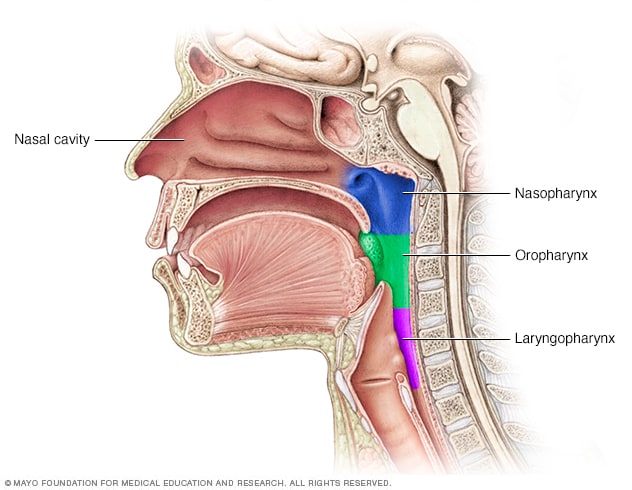Overview
Parts of the throat (pharynx)

Parts of the throat (pharynx)
The throat is a muscular tube that runs from the back of the nose down into the neck. The throat also is called the pharynx. It contains three sections: the nasopharynx, oropharynx and laryngopharynx. The laryngopharynx also is called the hypopharynx.
Nasopharyngeal carcinoma is cancer that starts as a growth of cells in the nasopharynx. The nasopharynx is the upper part of the throat. It sits behind the nose.
Nasopharyngeal (nay-zoh-fuh-RIN-jee-ul) carcinoma is rare in the United States. It happens much more often in other parts of the world, mainly Southeast Asia.
Nasopharyngeal carcinoma is hard to find early. That's most likely because the nasopharynx isn't easy to examine. And there may be no symptoms at first.
Treatment for nasopharyngeal carcinoma usually involves radiation therapy, chemotherapy or a mix of the two. Work with your healthcare professional to find the approach that's right for you.
Products & Services
Symptoms
Nasopharyngeal carcinoma may not cause signs or symptoms at first. When it does cause symptoms, they might include:
- A lump in your neck caused by a swollen lymph node.
- Bleeding from the nose.
- Bloody saliva.
- Double vision.
- Ear infections.
- Facial numbness.
- Headaches.
- Hearing loss.
- Nasal stuffiness.
- Ringing in the ears, called tinnitus.
- Sore throat.
When to see a doctor
Make an appointment with a doctor or other healthcare professional if you have any symptoms that worry you.
Causes
The exact cause of nasopharyngeal carcinoma often isn't known.
Nasopharyngeal carcinoma is a kind of cancer that starts in the upper part of the throat, called the nasopharynx. It happens when cells in the nasopharynx develop changes in their DNA. A cell's DNA holds the instructions that tell the cell what to do. In healthy cells, the DNA gives instructions to grow and multiply at a set rate. The instructions tell cells to die at a set time.
In cancer cells, the DNA changes give different instructions. The changes tell the cancer cells to make many more cells quickly. Cancer cells can keep living when healthy cells would die. This causes too many cells.
The cancer cells might form a growth called a tumor. The tumor can grow to invade and destroy healthy body tissue. In time, cancer cells can break away and spread to other parts of the body. When cancer spreads, it's called metastatic cancer.
Risk factors
Researchers have found some factors that seem to raise the risk of getting nasopharyngeal carcinoma. They include:
- Certain ancestries. Nasopharyngeal carcinoma is more common in parts of China, Southeast Asia, northern Africa and the Arctic. People who live in these areas or have ancestry that comes from these parts of the world may have an increased risk of nasopharyngeal carcinoma.
- Middle age. Nasopharyngeal carcinoma can occur at any age. But most often it's diagnosed in adults between the ages of 30 and 60.
- Salt-cured foods. Chemicals released in steam when cooking salt-cured foods might raise the risk of nasopharyngeal carcinoma. The steam from foods such as fish and preserved vegetables may enter the nose during cooking. Contact with these chemicals at an early age may raise the risk even more.
- Epstein-Barr virus. This common virus most often causes mild symptoms like those of a cold. Sometimes it can cause infectious mononucleosis. The Epstein-Barr virus also is linked to some cancers, including nasopharyngeal carcinoma.
- Family history. Having a family member with nasopharyngeal carcinoma raises the risk of the disease.
- Alcohol and tobacco. Heavy alcohol intake and tobacco use can raise your risk of nasopharyngeal carcinoma.
Complications
Nasopharyngeal carcinoma complications can include:
- Cancer that grows into nearby structures. Advanced nasopharyngeal carcinoma can grow large enough to go into nearby structures, such as the throat, bones and brain.
- Cancer that spreads to other areas of the body. Nasopharyngeal carcinoma often spreads beyond the nasopharynx. It typically spreads to the lymph nodes in the neck first. When it spreads to other parts of the body, nasopharyngeal carcinoma most often goes to the bones, lungs and liver.
Prevention
There's no sure way to prevent nasopharyngeal carcinoma. But, if you're worried about your risk of this cancer, think about giving up habits that have been linked with the disease. For instance, don't use tobacco. You may choose to cut back on or not eat salt-cured foods.
Tests to screen for nasopharyngeal carcinoma
In the United States and in other areas where the disease is rare, there's no routine screening for nasopharyngeal carcinoma.
In places where nasopharyngeal carcinoma is much more common, such as some areas of China, people at high risk of the disease may have screening. Screening may involve blood tests to detect the Epstein-Barr virus.
Oct. 10, 2024